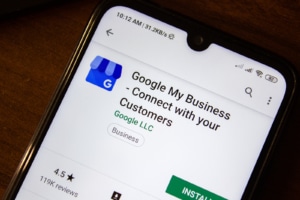We are thrilled to offer guidance and insights to our trauma therapists on SEO and service pages. Our team of SEO specialists has firsthand experience working with abuse, trauma, and survivors of DV. This gives us a unique perspective when it comes to marketing for individuals dealing with trauma. We hope that our holistic approach to SEO will provide you with the confidence needed to successfully reach out and speak to this clientele. Let us help you make an impact with your SEO and service pages!
What pages should you build out?

When building out your service pages, we typically recommend having a PTSD Treatment and Trauma Therapy page. This is because these are the most highly searched-for key terms. If you niche down with survivors of abuse, homicide, first responders, or DV survivors, then we would suggest making this the focus keyword, but still including PTSD treatment and trauma therapy on the page to draw in the people looking for this service. Additionally, as trauma therapists, we know that trauma doesn’t usually show up alone, in fact, many people dealing with trauma also deal with anxiety and depression. Therefore, creating service pages based on this focus will not only enhance your SEO because we can link back to these pages but your clients are not entirely sure if trauma is the issue. They can at least get a brief overview of how co-occurring disorders show up.
Use of Language on a PTSD and Trauma Page?
Sometimes when we are building out trauma pages for clients, we find that they struggle with using PTSD treatment on the page of the uncertainty that they will drive in a stream of more clinical diagnoses than they are ready to work with. However, in the SEO world, people are both searching for trauma therapy and PTSD treatment. If you’re worried about driving in the wrong clients, then realize that the keywords are what drive people to your website. The written content is what speaks to them as a person. If you don’t work with intense trauma clients, mention that in your copy. Or if your focus is on co-occurring disorders, say that too. Simply adding a subheading saying “ Who Do I Work Within Trauma Therapy” will help people to know whether or not you’re the right trauma therapist for them.
Additional Tips on Trauma Language and SEO for Trauma Therapists.
When it comes to trauma, it can be difficult to know what language is appropriate. However, it is essential to use natural language in your sessions and copy that resonates with the individual survivor’s experience. It may take many attempts before they are able to accept that the abuse or assault was not their fault – so reiterating this message demonstrates genuine empathy and understanding. Additionally, remember that each individual survivor is just that – an individual. Acknowledge the person first and foremost, not the problem or issue they are facing. Using a person’s preferred language can go a long way in providing comfort and assurance during difficult times. Doing so will help to foster trust and create a safe space for recovery.
Keywords for a Trauma Therapy Page
Here is a compilation of important keywords related to PTSD treatment and trauma therapy that people strive to rank for in SEO efforts:
- PTSD treatment
- Trauma Therapy
- Intergeneration Trauma
- EMDR Therapy
- TF-CBT
- Cognitive Processing Therapy
- Brainspotting
- Somatic Experiencing
- Trauma-Informed Care
- Supportive Trauma Counseling
- Emotional Trauma Treatment
- Complex Trauma
- Trauma and Anxiety
- Trauma and Depression
- Feeling stuck
- Trauma Therapist
- Mindfulness-Based Stress Reduction (MBSR)
- PTSD therapy near me
- Trauma therapy near me
- Healing Childhood Trauma
- Childhood Emotional Neglect
- Attachment-Based Therapy
- EMDR Therapist
These are just a few examples of keywords you could rank for, but the list goes on. That is why we have specialists who can help with SEO for trauma therapists, who are here to help you break down what makes sense to rank for and what doesn’t.
If you specialize in trauma and you have a certain modality you approach most often, it would be helpful for your rankings to create a modalities page, breaking down in client language what they can expect being in that setting with you. Additionally, creating blog posts where you answer commonly asked questions or give a resource guide will help to better connect with the client.
Resources to link to?

As many of you know, linking is a big piece of the puzzle to rank for SEO for trauma therapists. We add internal links, so for example, if you have a PTSD treatment page, then we may link to your anxiety, depression, or modality page to provide more movement in your site but also to show Google there is a connection between the topics. This also shows your clients that there is a connection. So if you connect to your anxiety page from a trauma page and have a subheading in each discussing the connection, your client and Google will begin to recognize the connection between the topics.
Additionally, we also suggest having at least one external link on your site. This is meant to help build up your trust flow with Google. When you connect to an already well-ranked site, this will build your site’s credibility.
Great SEO External Links for Trauma Therapists:
- EMDRIA
- The Veterans Association
- PTSD.VA
- The CDC
- NIMH
- RAINN
- The Domestic Violence Hotline
- TF-CBT
- Brainspotting
- Somatic Experiencing
Make sure if you’re using these as external links, it is essential to bear in mind that while their great resources, copying content from other websites is not advisable. Google identifies duplicate content and will recognize the source, so it’s best to stick to the original ideas and rephrase them in your own language.
Blogging Helps SEO for Trauma Therapists Because You’re Able to Communicate Your Voice!
Blogging. The infamous and necessary next steps in your journey ranking for SEO for trauma therapists. Blogging is a powerful tool to connect to your ideal audience. Even if you’re a group practice that offers everything, blogging can help your particular mission and perspective be seen better.
What should therapists blog about?
We encourage you to write intentional and carefully crafted blog posts to answer common questions you hear in your practice.
- For example, you could write an open letter to moms recovering from birth trauma. What do I say to my daughter who was raped?
- Or simple things first responders can say to calm a person down in a crisis situation.
- Resource guides and tips are useful for your client and it gives them a glimpse into the kind of care they can expect from you as a therapist.
Remember, blogging is your passion piece, so don’t be afraid to be real and talk about the tough issues.

Write blogs for their loved ones too.
Blogs are also a great resource for the family and loved ones of people dealing with trauma. They may struggle to know how to help their child, partner, friend, or family member. By giving them some helpful tips, you can help them to process what is going on in their loved ones’ lives. They may not fully understand, but when people don’t understand a loved one’s pain, they often want answers and guidance, but by providing blogs for the whole unit, they will feel better supported and even feel like they can help their loved ones better.
Get in Touch With Our Talented Team to Learn More About SEO for Trauma Therapists!
As trauma therapists and mental health professionals, we have the power to make a tremendous impact on how people live their lives. By utilizing SEO-driven person-centered service pages and blogs, we can create an online presence that helps those stuck in trauma find freedom and feel heard. Asking for help is a process, so be patient with clients who may visit your website multiple times before seeking help. Together, we can make a difference by providing the resources, support, and guidance they need to heal from their trauma.
If you could use some support, then reach out to us for help. Our skilled and passionate team of SEO specialists who are mental health nerds at Simplified SEO Consulting would be excited to help you on your SEO journey. To get started with our service follow these simple steps:
- Apply to Work with us and schedule your consultation
- Learn more about our talented team of SEO Specialists.
- Begin putting your unique voice out there and continue making the impact you desire on those around you.
Other Services offered by Simplified SEO Consulting
Simplified SEO consulting offers a wide range of services that can help you begin working with your people. We offer. Done for You SEO Service packages, online courses, and SEO training opportunities. Our most popular course includes our “Top of Google” Online course, and we have 12 weeks (about 3 months) of intensive SEO for those who want to learn with a guide. For those looking for a more specialized package, we also offer an SEO strategy package. To get started, schedule a consultation with our Client Success Specialist today!
About the Author: 
Jasmine has a Master’s Degree from Northwestern University and is a trauma therapist who specializes in Cognitive Processing Therapy at Aspire Counseling in Columbia, MO. She is also our consult lead and our SEO Training Coordinator at Simplified. Jasmine has experience hosting SEO webinars, consults, training through strategy sessions, using data to inform strategy, and she regularly works to provide support for alumni. If you are looking to get expert SEO support, Jasmine is one of many individuals on our team with excellent insight. Jasmine specializes in supporting clients who are looking to rank nationally and internationally and works often with our eating disorder therapists and coaches.

 One of our focuses in SEO work is getting more organic search traffic to websites. For today’s purposes, we won’t dive into how we do our SEO magic of getting web surfers to a specific website or page. Instead, we’ll talk about how to make websites more inclusive to the LGBTQ+ community.
One of our focuses in SEO work is getting more organic search traffic to websites. For today’s purposes, we won’t dive into how we do our SEO magic of getting web surfers to a specific website or page. Instead, we’ll talk about how to make websites more inclusive to the LGBTQ+ community. When choosing photos for your site, consider mixing them up! Think about your ideal clients. What would they look like in images?
When choosing photos for your site, consider mixing them up! Think about your ideal clients. What would they look like in images? One way you can support the LGBTQ+ community this Pride month is to get certified in
One way you can support the LGBTQ+ community this Pride month is to get certified in 






 About the Guest Author
About the Guest Author













 The first, and easiest way, you can tell Google where you’re located is by adding your address to the footer of your website. That way it’s visible on every page. The goal of doing this is to let Google know exactly where you’re located and what services you provide. Furthermore, it makes it easy for your ideal client to get in touch with you. It’s common for contact information to be at the footer so people are likely to scroll all the way down and see it.
The first, and easiest way, you can tell Google where you’re located is by adding your address to the footer of your website. That way it’s visible on every page. The goal of doing this is to let Google know exactly where you’re located and what services you provide. Furthermore, it makes it easy for your ideal client to get in touch with you. It’s common for contact information to be at the footer so people are likely to scroll all the way down and see it.  Google Maps
Google Maps Our goal is to help clients get to the top of google and attract their ideal clients in their area. If you’re interested in optimizing your private practice website, we would love to speak with you and tell you more about your services. To begin
Our goal is to help clients get to the top of google and attract their ideal clients in their area. If you’re interested in optimizing your private practice website, we would love to speak with you and tell you more about your services. To begin 